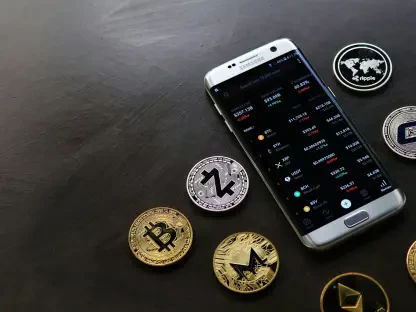Imagine a world where financial transactions are fast, secure, transparent, and free from the inefficiencies that plague traditional systems. This is not merely a futuristic vision but an emerging reality, thanks to blockchain technology’s integration into fintech. By leveraging blockchain’s decentralized ledger, financial services are becoming more efficient, secure, and accessible to individuals worldwide.
Enhanced Efficiency and Reduced Costs
Decentralized Finance (DeFi) Transformations
Blockchain’s immutable and transparent nature sets the foundation for Decentralized Finance (DeFi), which fundamentally alters how financial transactions are conducted. Traditional financial systems often suffer from high fees, slow transaction times, and opaque processes, issues that DeFi aims to resolve. DeFi platforms enable peer-to-peer financial interactions on blockchain networks, significantly reducing the need for intermediaries. This reduction in intermediaries leads to lower transaction costs and faster processing times. Blockchain’s distributed ledger minimizes operating expenses as each transaction involves fewer parties, hence less service charge.
Additionally, blockchain’s real-time transaction capabilities address the issue of delayed payments, a common grievance in conventional banking. Traditional transactions may take days to process, especially cross-border payments. By using blockchain, transactions can be completed in minutes, if not seconds. This speed is crucial in global commerce, where time is often money. Blockchain technology ensures that all parties involved in a transaction can view and verify it instantly, eliminating the need for central authorities to oversee and approve operations. Consequently, financial services providers can streamline their operations, offering quicker, more efficient services to their clients.
Smart Contracts and Automated Processes
Another critical innovation that blockchain brings to the table is the implementation of smart contracts. These self-executing contracts with terms directly written into code automatically enforce and execute agreements once predetermined conditions are met. Traditional contract execution typically involves several intermediaries, manual processes, and considerable time, resulting in higher costs and risks of human error. In comparison, smart contracts facilitate faster, more cost-effective, and error-free transactions.
For instance, in insurance, blockchain-based smart contracts can automatically trigger claim settlements when programmed conditions, like specific weather data, get fulfilled. This ensures that policyholders receive payouts promptly, without the need for extensive paperwork or human intervention. Similarly, in lending, smart contracts can automate loan issuance and repayment processes, reducing administrative overheads and minimizing default risks through programmatic enforcement of terms.
Smart contracts also enhance transparency in contractual obligations, as the contract terms and execution status are visible to all participants on the blockchain network. This openness builds trust among parties and reduces the likelihood of disputes. By providing a reliable and automated mechanism for executing agreements, blockchain is revolutionizing the efficiency of financial services and significantly cutting down associated costs.
Improved Security and Accessibility
Global Access to Financial Services
Blockchain technology markedly amplifies the accessibility of financial services, enabling global reach regardless of physical, technological, or regulatory constraints. Traditional financial systems are often limited by geographic boundaries and regulatory environments, restricting service access to certain regions and demographics. In contrast, blockchain-based decentralized applications (DApps), cryptocurrencies, and smart contracts transcend these barriers, providing financial inclusion to the unbanked and underbanked populations.
Cryptocurrencies, which operate on blockchain, allow users to transfer funds across borders without the need for currency conversion or hefty transfer fees. This capability is particularly advantageous for individuals in developing countries who lack access to traditional banking infrastructure. Similarly, blockchain empowers microfinance institutions by streamlining loan processes, ensuring that even those in the most remote areas can access financial services. By bypassing conventional limitations, blockchain fosters a more inclusive financial environment, enabling economic participation on a global scale.
Moreover, blockchain’s decentralized nature ensures that financial services are available 24/7, unlike traditional banks that operate within specific hours and are susceptible to shutdowns. This accessibility is critical in emergencies, where timely financial transactions can be lifesaving. With blockchain, individuals have full control over their assets and can conduct transactions anytime, anywhere, fostering a more connected and resilient financial ecosystem.
Enhanced Security Measures
Imagine a world where financial transactions happen instantly, securely, transparently, and without the inefficiencies that burden traditional systems. This scenario is not just a futuristic dream but an emerging reality, thanks to blockchain technology’s integration into the financial technology (fintech) sector.
Blockchain’s decentralized ledger offers several benefits to financial services, making them more efficient, secure, and accessible on a global scale. The technology enables quicker transaction times, reduces fraud, and eliminates the need for intermediaries, thus cutting costs. It also enhances transparency, providing a clear, immutable record of transactions. This level of transparency helps build trust among users and regulatory bodies alike.
Moreover, blockchain’s decentralized nature democratizes access to financial services, allowing unbanked populations to participate in the global economy. This inclusive approach could significantly impact economic equality, offering financial services to those who were previously excluded. In summary, the integration of blockchain technology in fintech represents a significant leap forward, promising a future where financial transactions are faster, safer, and more inclusive for everyone.









